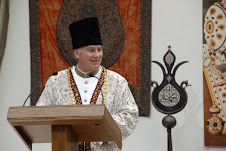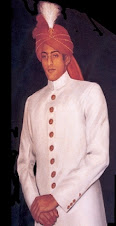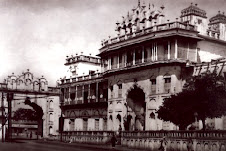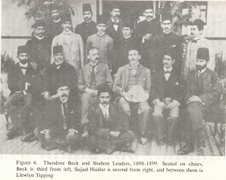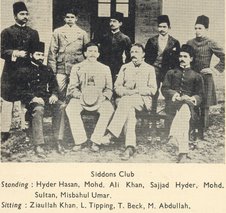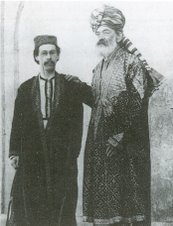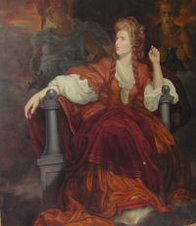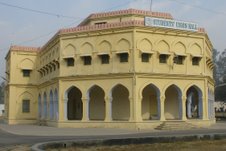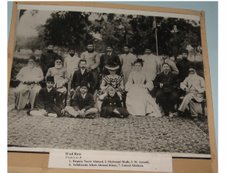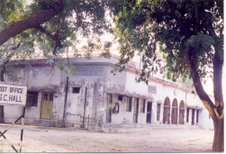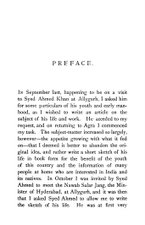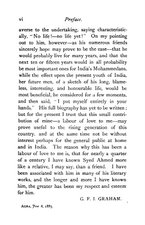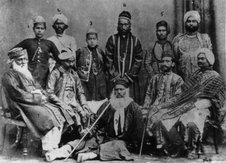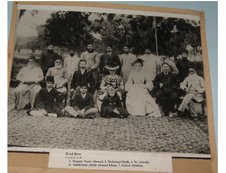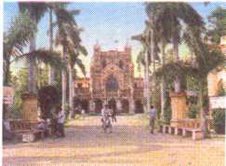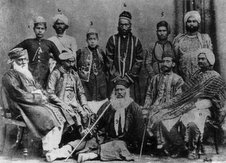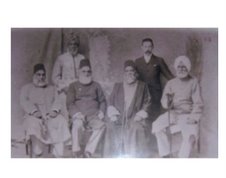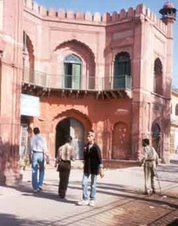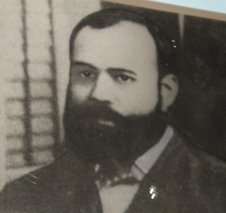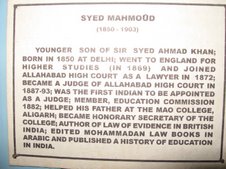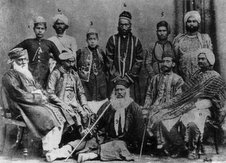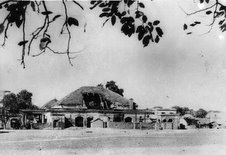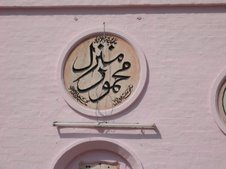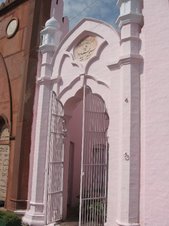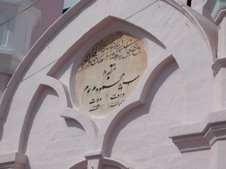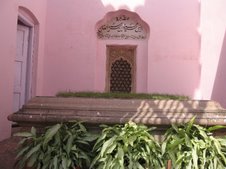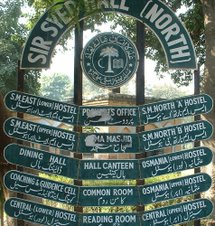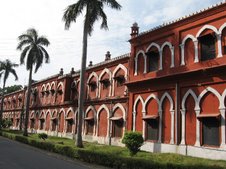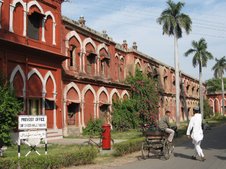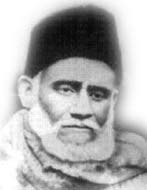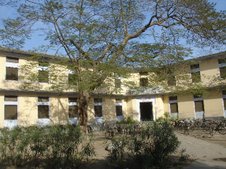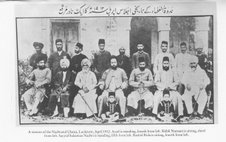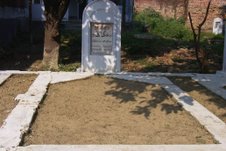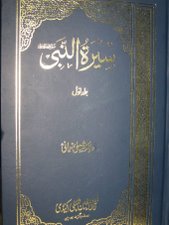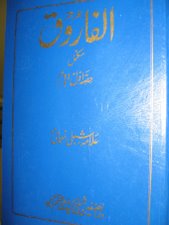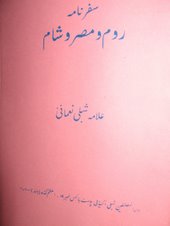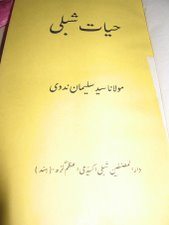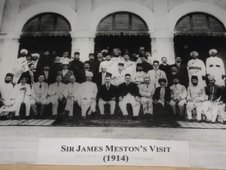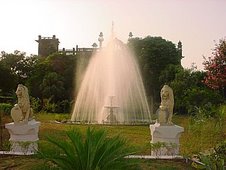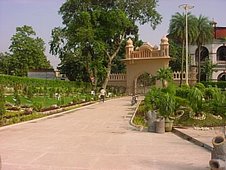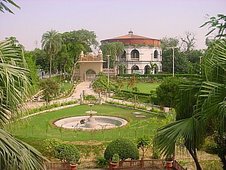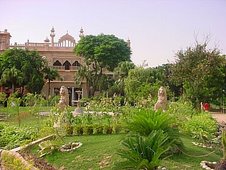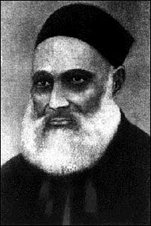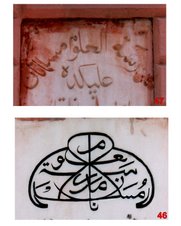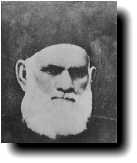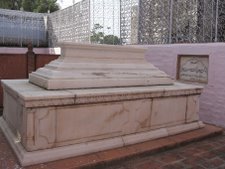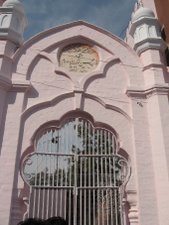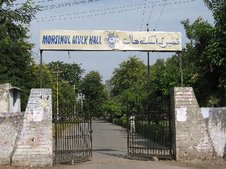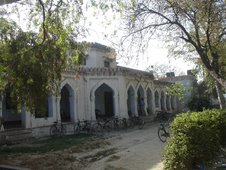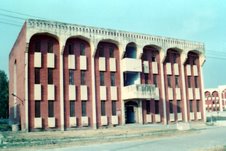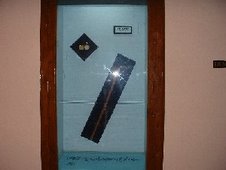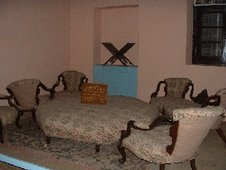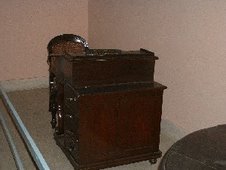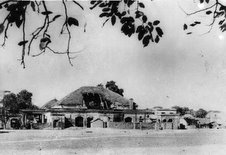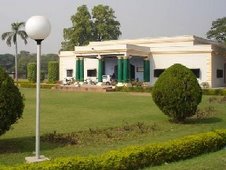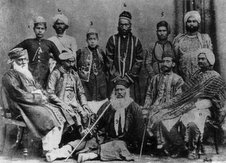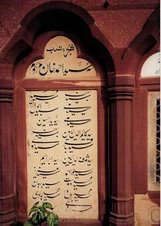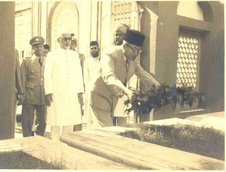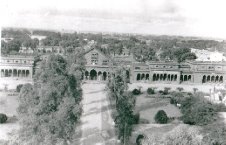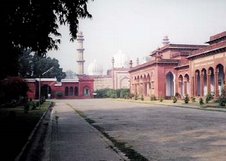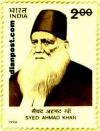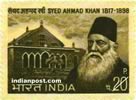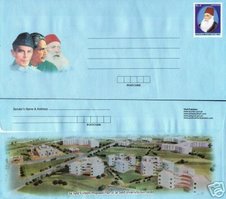Founder Chancellor : Begum Sultan Jahan
H.H. Sultan Kaikhusrau Jahan Begum,
Ruler of Bhopal
Born: 9th July 1858, Princely state of Bhopal, India
Died: 12th May, 1930
Spouse:H.H. 'Ali Jah, Ihtisham ul-Mulk, Nasir ud-Daula, Nawab Ahmad 'Ali
Ruler of Bhopal
Born: 9th July 1858, Princely state of Bhopal, India
Died: 12th May, 1930
Spouse:H.H. 'Ali Jah, Ihtisham ul-Mulk, Nasir ud-Daula, Nawab Ahmad 'Ali
Khan Bahadur of Muzaffar Nagar, Sultan Dulha Sahib, Nawab Consort of Bhopal
Father:General H.H. Nasir ud-Daula, Nawab Baqi Muhammad Khan
Mother:Sultan Shah Jahan Begum (29th July 1838- 16th June, 1901)
Father:General H.H. Nasir ud-Daula, Nawab Baqi Muhammad Khan
Mother:Sultan Shah Jahan Begum (29th July 1838- 16th June, 1901)
Ruler of Bhopal from 11th April 1845 to 30th April, 1860 &
2nd November 1868 to 16th June 1901)
Children:Nawab Hafiz Sir Muhammad Nasru'llah Khan Sahib Bahadur, KCSI
Al-Haj Mohsin ul-Mulk, Nawab Hafiz Muhammad Ubaidu'llah Khan
Children:Nawab Hafiz Sir Muhammad Nasru'llah Khan Sahib Bahadur, KCSI
Al-Haj Mohsin ul-Mulk, Nawab Hafiz Muhammad Ubaidu'llah Khan
Sahib Bahadur, CSI
Al-Haj Nawabzada Hafiz Muhammad Hamidu'llah Khan
Al-Haj Nawabzada Hafiz Muhammad Hamidu'llah Khan
(Chancellor of AMU-Aligarh – 21st Sep. 1930 to 17th April 1935)
Sahabzadi Bilqis Jahan Begum
Sahabzadi Asif Jahan Begum
Career:
16th June 1901-29th April 926: Nawab Begum of Darul-Iqbal-i-Bhopal, Ruler of Bhopal
17th Dec.1920-12th May 1930:Founder Chancellor of Aligarh Muslim University, Aligarh
The first Indian woman to become a chancellor of an Indian University
1914: President. All-India Muslim Ladies Conference
1918: Founder, All India Ladies Association
Honors:
Sahabzadi Bilqis Jahan Begum
Sahabzadi Asif Jahan Begum
Career:
16th June 1901-29th April 926: Nawab Begum of Darul-Iqbal-i-Bhopal, Ruler of Bhopal
17th Dec.1920-12th May 1930:Founder Chancellor of Aligarh Muslim University, Aligarh
The first Indian woman to become a chancellor of an Indian University
1914: President. All-India Muslim Ladies Conference
1918: Founder, All India Ladies Association
Honors:
1st Jan 1910 :Knight Grand Commander (GCSI)
24th June, 1904: Knight Grand Commander (GCIE)
CI (1st Dec. 1911), GBE (27th Dec. 1917) Delhi Durbar gold medal (1903), Coronation medal (1911 with Durbar clasp), DGBStJ (17.3.1916),
20.8.1911: Order of Nobility (Nishan-i-Majidi) 1st class in brilliants of Turkey
24th June, 1904: Knight Grand Commander (GCIE)
CI (1st Dec. 1911), GBE (27th Dec. 1917) Delhi Durbar gold medal (1903), Coronation medal (1911 with Durbar clasp), DGBStJ (17.3.1916),
20.8.1911: Order of Nobility (Nishan-i-Majidi) 1st class in brilliants of Turkey
Books Authored:
Bachoon Ki Parvarish
Gohar e Iqbal
Gule Khanda
Hayat e Shah Jahani (Persian)
Hayat e Shah Jahani (Urdu)
Rouzatur Riyaheen
The Story of a Pilgrimage to Hijaz
Hidayat uz-Zaujan
Sabil ul-Jinan
Tandurusti (Health)
Hidayat Timardari
Maishat-o-Moashirat
Bachoon Ki Parvarish
Gohar e Iqbal
Gule Khanda
Hayat e Shah Jahani (Persian)
Hayat e Shah Jahani (Urdu)
Rouzatur Riyaheen
The Story of a Pilgrimage to Hijaz
Hidayat uz-Zaujan
Sabil ul-Jinan
Tandurusti (Health)
Hidayat Timardari
Maishat-o-Moashirat
H.H. Sikander Saulat, Iftikhar ul-Mulk, Nawab Sultan Kaikhusrau Jahan Begum Sahiba, Nawab Begum of Darul-Iqbal-i-Bhopal, was born at Bhopal on 9th July 1858. She was eldest child of the family of H.H. Nawab Sultan Shah Jahan Begum Sahiba, Nawab Begum of Dar ul-Iqbal-i-Bhopal, and General H.H. Nasir ud-Daula, Nawab Baqi Muhammad Khan Bahadur, Umrao Dulha, Nusrat Jang. Her younger sister, Sahibzadi Sulaiman Jahan Begum Sahiba was born at Bhopal on 26th November 1860, but died from smallpox on 8th June 1865. So Begum Kaikhusrau Sultan Jahan, popularly known as Begum Sultan Jahan was only surviving child and heir of Darul-Iqbal-i-Bhopal. As per the Islamic and royal traditions of Darul-Iqbal-i-Bhopal, she was privately educated at the place. Her maternal grandmother, Nawab Sikandar Begum Sahiba paid special attention on her education. Qualified teachers and instructors were appointed for Urdu, Persian, Arabic and English. She was trained in horse riding, shooting and archery. She also learned handicraft, traditional arts and Calligraphy. Special attention were paid for Islamic and Quranic studies. On 30th October 1868, Begum Sultan Jahan’s grandmother Nawab Sikandar Begum Sahiba, ruler of Bhopal died due to kidney failure and H.H. Nawab Sultan Shah Jahan Begum took over the rein of Bhopal. Young Sultan Jahan Begum became the Crown Princes of Bhopal. Her strict academic schedule got affected due to her engagements with state affairs being as crown princes but she managed to continue her academic pursuit. She continued to receive Tafseerul Quran lessons from Maulvi Jamaluddin Khan and Persian lessons from Maulvi Mohammad Ayub. In spite of her busy schedules, she never missed her English lessons. Her acceptance speech at coronation ceremony was remarkable and long lasting impression on the attendees.
Begum Sultan Jahan was married to H.H. 'Ali Jah, Ihtisham ul-Mulk, Nasir ud-Daula, Nawab Ahmad 'Ali Khan Bahadur, Sultan Dulha Sahib, Nawab Consort of Bhopal at Shaukat Mahal, Bhopal on 1st February 1874. Nawab Ahmad 'Ali Khan Bahadur was born in January 1854 at state of Jelallabad of Muzaffar Nagar. Allah blessed them with 5 children; Nawab Hafiz Sir Muhammad Nasru'llah Khan Sahib Bahadur, KCSI, Al-Haj Mohsin ul-Mulk, Nawab Hafiz Muhammad Ubaidu'llah Khan Sahib Bahadur, CSI, Al-Haj Nawabzada Hafiz Muhammad Hamidu'llah Khan, Sahabzadi Bilqis Jahan Begum and Sahabzadi Asif Jahan Begum.
On 16th June1901, H.H. Nawab Sultan Shah Jahan Begum Sahiba, ruler of Bhopal died and Nawab Sultan Kaikhusrau Jahan Begum, the only surviving child of Sultan Shah Jahan begum became the Ruler of Bhopal. The official Installation ceremony was held on 4th July, 1901 at the Sadar Manzil, Bhopal. On 4 July 1901, Sultan Jahan assumed the title of ruler of Bhopal at the mature age of 43 after serving 33 arduous, harrowing years under Shah Jahan as heir apparent. All three preceding Begums had mounted the masnad at a young age – Qudsia Jahan was 19 when she became regent of Bhopal, Sikandar Jahan was regent of Bhopal at 26, while Shah Jahan was titular ruler of Bhopal at the age of seven and full fledged Begum of Bhopal at 30. As she was proclaimed ruler of Bhopal, Sultan Jahan looked older then her 43 years. Immediately after Begum Shah Jahan’s death, the British moved quickly to announce her succession as ruler of Bhopal. The Investiture Durbar was held at Sadar Manzil of Bhopal, at which Mr. Wyndham represented Lord Curzon, the Viceroy and Governor-General of India, the first assistant to the resident. Soon after becoming the Ruler of Bhopal, begum Sultan Jahan lost her husband. Nawab Ahmad 'Ali Khan Bahadur died on 4th January 1902 in Bhopal. As Sultan Jahan took over the states administration, she found that the cupboard was bare. Shah Jahan and her henchmen had dissipated the finances to the extent that the state was heavily in debt and only 40,000 rupees were left in the treasury. A fighter by nature, Sultan Jahan resolved to put matters right, rolled up her sleeves and began the uphill task of rehabilitation and revival. For over a year Sultan Jahan built up her own team of upright and conscientious officials who helped her put the ship of state back on an even keel Sultan Jahan’s first task was to gain confidence of her rural subjects and helping Bhopal recover from Shah Jahan’s lax and divisive rule. Sultan Jahan’s visit to the outlying villages was not simply representational tours, but serious attempts at seeking solutions to agrarian problems. The atmosphere was all work and austerity, with long hours spent listening to the plaints of village folks. There was no shikar, polo playing or midnight revelry as in Shah Jahan’s days, but an ambiance of rigorous hard work for herself and her staff. She inducted her grown-up sons, Nasrullah and Obaidullah, into the process of governance and administration and even “little Hamid”, her eight-year-old third son, accompanied his mother to be given a taste of royal responsibility. She further advanced the emancipation of women and established a modern municipality in 1903. By 1911, King Edward VII of England had died and George V was to be crowned. Sultan Jahan was invited to attend the Coronation in London. Sultan Jahan left heir apparent Nasrullah in Bhopal to hold the fort while she took Obaidullah, his wife Shahryar Dulhan, Hamid and his child bride Maimoona Sultan with her on her journey to Europe. She attended the coronation of King George V in 1911 dressed in a burqa with her awards worn on the outside. During the trip, she visited Paris, a spa in Bad Nauenheim in Germany, spent a week in Genève and travelled by the Orient Express to Istanbul, where she met the sultan-emperor, Mehmet Reshad. She also visited Hungary, Italy and Egypt where she embarked on her return journey to a Bhopal struck by plague. Later that year she attended the Imperial Dunbar in Delhi. She introduced free compulsory primary education in 1918. She Established an Executive and Legislative Council in 1922. A great reformer, like her mother and grandmother, she reformed taxation, the army, police, the judiciary and jails, expanded agriculture, and constructed extensive irrigation and public works. She established an appointed state council and legislative assembly, and instigated elections for municipalities. However, her main legacy is public health, by pioneering widespread inoculation and vaccination program, improving sanitation, hygiene and the water supply. On 29th April 1926, while still away from Bhopal in London, Sultan Jahan informed the secretary of state for India, Lord Stamfordham that she was abdicating as Begum of Bhopal in favor of her son, Al-Haj Nawabzada Hafiz Muhammad Hamidu'llah Khan. A decision that stupefied the British ministers. There was another flurry of legal controversy in the Viceroy’s Secretariat questioning the Begum’s right to abdicate as ruler of Bhopal. The Begum refused to accept, and the British eventually accepted on 17th May 1926 accepting Hafiz Hamidullah Khan as the ruler of Bhopal. . After her abdication, she became an advocate of women’s right. The peaceful rule of Begums led to the rise of a unique mixed culture in Bhopal. The Hindus were given important administrative positions in the state. This led to communal peace and a cosmopolitan culture took its roots.
H.H. Begum Sultan Jahan died on 12th May 1930 at Qasr-e-Sultani Palace in Bhopal and buried near the grave of Pir Zia ud-din.
Association with Aligarh Movement:
The royal family of Bhopal was always supportive to Aligarh Movement. H.H. Begum Shah Jahan supported Scientific Society, donated a sum of 10,000 Rupees for M.A.O. College Jama Masjid construction. Begum Sultan Jahan was very much supportive to the vision and mission of Sir Syed Ahmad Khan. She took over the rein of Bhopal after the death of Sir Syed, but always helped M.A.O. College with a great generosity. When Nawab Viqarul Mulk was Secretary of College, a better understanding was developed between M.A.O. College and Begum Sultan Jahan. In 1910, she enrolled her son, Hafiz Hamidullah Khan to M.A.O. College Aligarh. This represented an historic step for the Bhopal royal family, as Hafiz Hamidullah Khan was the first of its members to be given a formal university education. She and other members of the family donated a sum of 50000/- Rupees for College building fund. All India Muslim Educational Conference established by Sir Syed Ahmad Khan was also receiving regular support from Begum Sultan Jahan. She visited Aligarh on 27th February, 1914 and laid the foundation stone of All India Muslim Educational Conference building. This building is now known as “Sultan Jahan Manzil”. When H.H. Agha Khan stopped his annual financial help to the College, H.H. Begum Sultan Jahan persuaded him to continue his support for the College. H.H. Agha Khan was convinced and restarted his annual generous donation to College Fund. In annual session of Muslim Educational Conference in 1910, the idea of Muslim University was made public and H.H. Agha Khan and Nawab Viqarul Mulk visited H.H. Begum Sultan Jahan in Allahabad. She immediately donated 100,000/- (One Lakh Rupees for the cause of Muslim University). She also promised to donate money for electricity and electrical appliance for the College. She extended her full support for Muslim University and promised to talk to other princely states, landlord and wealth people and specially to H.H. Nizam of Hyderabad for their support for Muslim University. When the fund raising for Muslim University was started, Bhopal was one of the Provincial Center and Begum Sultan Jahan took a lead role to raise funds. She made encouraging speeches at different places including Price of Wales Ladies Club. She accepted the plaque of Honor from The MAO College Trustees and visited Aligarh to inaugurate Sultan Jahan Building in 1915. She had an open discussion with Trustees and MAO College staff. She gave invaluable advises to the students, staff and Trustees. She also fully financed Allama Shibli Nomani’s Seeratun-Nabi publication. Even after the death of Allama Shibli Nomani, H.H. Begum Sultan Jahan supported Allama Shibli’s designated heir and disciple Maulana Syed Sulaiman Nadvi.
H.H. Begum Sultan Jahan paid attention to women education and supported Mohammad Girls School of Aligarh started by Sheikh Abdullah (Papa Min). The management of Girls school was looking for an acceptable curriculum but due to lack of funds were a major roadblock. H.H. Begum Sultan Jahan paid special attention and donated generously to develop a proper curriculum for women education. She took personal interest and developed an outline of curriculum and presented it in her Presidential address of the women education session of the annual Muslim Educational Conference on 5th December 1911. She proposed the idea of Home science in the curricula of women education to make it more attractive for majority of the community. In her visit to Aligarh in 1915, she inaugurated the Girls School building laid the foundation stone for girl’s hostel.
On December 17th, the Aligarh Muslim University came into being. According to the act (Section III) the first Chancellor, the first Pro-Chancellor and the first Vice-Chancellor were to be appointed by the Governor General of India. In an Annexure the act gave a list of 124 Foundation members of the First AMU Court. The Governor General of India, Lord Chelmsford appointed H.H. Mohammad Ali Mohammad, Raja Mahmudabad as its first Vice- Chancellor. Her Highness Sultan Jahan Begum of Bhopal and H.H. Sir Agha Khan were respectively appointed as Chancellor and Pro-Chancellor of the Aligarh Muslim University. The inaugural ceremony of University took place on the 17th December, 1920.
In spite of her busy schedule Begum Sultan Jahan used to participate in University Function. She presided over the First Convocation of newly established Aligarh Muslim University on 28th December, 1922. In her presidential address, Begum Sultan Jahan said;
“We meet today to celebrate the First Convocation of our University, the fruit of fifty years of our national exertion and aspirations. To the pioneer of this movement, Sir Syed Ahmad Khan, Mohsinul Mulk and Viqarul Mulk, who first saw the vision of a common and united centre of Muslim culture, and who devoted their lives to its realization, the nation owes a great debt of gratitude. Great would have been their happiness to see their efforts crowned with success. With this noble system of education at the back, The University will rear the genius of men like, Averroes and Avicenna (Ibn Sina), Sheikh Saadi, Al-Ghazali, Ibne Musa, Abu Maashar-i-Falaki, Shah Waliullah, Shah Abdul Azeez, Haali and Shibli, who will rekindle the spark of Islamic civilization and usher in a brighter and more glorious era in the annals of Islam.”
Begum Sultan Jahan also addressed the annual convocation of 1925. She extended her support and served as Chancellor of Aligarh Muslim University till her last breath. After her sad demise on 12th May 1930, her son, ruler of Bhopal and M.A.O. College alumnus, Nawab Hafiz Hamidullah Khan was elected as Chancellor of Aligarh Muslim University.






